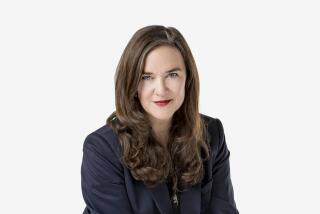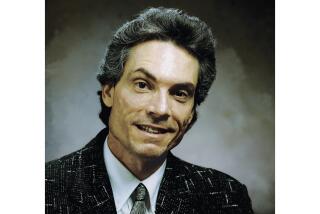Influential investor Gordon Crawford has left his mark on media
The black BMW 750 looks out of place alongside all the Toyotas and Hondas in the parking lot of public radio station KPCC-FM (89.3) in Pasadena.
The man who owns the sleek sedan also looks a little out of place. Wearing black pinstripes in a room full of khaki, Gordon “Gordy” Crawford is here to talk to the newsroom about the global economy.
This is the same man who’s considered to be one of the smartest guys in Hollywood, the influential investment fund manager best known for dispensing wisdom to the titans of media, entertainment and technology, not journalists.
“Gordy is the guy that makes Rupert Murdoch jump; Gordy is the guy that Steve Jobs listened to; and Gordy is the guy that Bill Gates is scared of,” media heavyweight and former News Corp. President Peter Chernin said at a recent dinner honoring Crawford.
Now Crawford, who on Friday at age 65 will wrap up a four-decade career at the giant Los Angeles investment firm Capital Group, is focusing his heft and attention on his second act: fixing journalism.
“I believe that unbiased in-depth journalism is critical to a functioning democracy,” Crawford said at his modest office in downtown’s Bank of America high-rise. “There is a huge secular decline in the number of journalists in the United States.... I do worry about that.”
Crawford has put his money where his mouth is, ponying up $4 million to help fund a new $24.5-million broadcast facility for KPCC. Its board, which Crawford once chaired, is full of media bigwigs including 20th Century Fox Chairman Jim Gianopulos.
Crawford’s goal is to grow the station’s reporters to 75 in the next few years from 23. “The question we’re asking is whether in all the major markets a new form of journalism is going to emerge that is serious, balanced, unbiased reporting supported by philanthropy,” he said. “Whether it is wealthy individuals who are going to be major donors, foundations or the average citizen sending in a hundred bucks or two hundred bucks a year, can you develop enough revenues to actually deliver the kind of hard news you need?”
That an investor and securities analyst frets so much about the quality of journalism may seem unusual. But those who have done business with Crawford say his fears are real.
“We’ve sat around and talked about the fact that the media industry has drifted away from hard news and has become very shallow,” said John Malone, chairman of cable programming behemoth Liberty Media Corp. “Democracy doesn’t work very well if all the people are stupid or misinformed. He feels it may be possible to do something about it.”
Born in New York and raised in tony Old Greenwich, Conn., Crawford grew up in a prominent family. His father, the late Morris Crawford, was a lawyer who later became chief executive of Bowery Savings Bank. While most kids dream of being a firefighter or an astronaut, Crawford was obsessed with Wall Street at an early age. He spent the summers of his youth working at banks.
After getting an MBA from the University of Virginia, Crawford landed at Capital Group in 1971 and in 1973 became one of the managers of its Growth Fund of America. At the time, Growth Fund was struggling, with just $12 million in assets. Crawford was part of the team that took the fund to $200 billion at its peak before the market tumbled in 2008. (It now has about $125 billion in assets.)
When Crawford started out, few analysts and investors paid much attention to the entertainment industry. Crawford immersed himself in Hollywood, and a few years later he added cable to his portfolio. He became something of a consigliere to such magnates as Malone, CNN founder Ted Turner and the heads of Warner Bros. and Walt Disney Co.
“I got to know the guys who transformed the business,” Crawford said, adding that in those days betting on media stocks was pretty much a sure thing. “It was like an ATM if you invested in those companies in that period.”
For example, Crawford was an early investor in Malone’s Tele-Communications Inc. and Liberty Media, with Capital Group owning 43% of the latter as the stock went up 20 times in its early years. Crawford invested in practically every cable stock in the late 1970s and early ‘80s, when the industry started to take off.
Capital Group also held at various times large stakes in News Corp., Walt Disney Co. and Time Warner as well, and Crawford often seemed to have a knack for being at the right place at the right time.
In 1995, Crawford and his wife, Dona, along with Tom Brokaw and his wife, Meredith, were visiting Ted Turner at his Montana ranch when then-Time Warner Chief Executive Gerald Levin flew in to talk deals.
“Ted is running down the valley screaming, ‘I got good news, Jerry wants to buy our company!’” Crawford recalled. (Crawford naturally had to halt trading in the companies. Time Warner subsequently acquired Turner’s company.)
Not all of Crawford’s bets paid off. He was an early supporter of AOL’s acquisition of Time Warner, a merger that lives in infamy.
“Probably the biggest mistake of my career,” conceded Crawford. “I didn’t understand it enough to understand that AOL was a fundamentally flawed company.”
It was Crawford who basically forced the resignation of Steve Case from the top spot at AOL Time Warner. Malone, Turner and Crawford huddled in Malone’s office to pick a triggerman, and the investor drew the short straw.
“Ted said he couldn’t do it because he was a board member and John said he couldn’t do it because he had too many commercial relationships with Time Warner,” Crawford said. “It fell on me to talk with Steve.”
With Crawford, however, his investment choices alone usually did the talking and he was often ahead of the curve. In 2001 he dumped almost 66 million shares of Disney after he soured on then-CEO Michael Eisner, who was eventually forced out in 2005.
Although Crawford has become social friends with many of the CEOs he has bet on, he’s never let that stop him from telling them when he thinks they’re messing up, albeit very politely.
“He can basically tell you to go to hell and you’ll ask for directions,” cracked his close pal and business associate Michael Burns, vice chairman of Lions Gate Entertainment Corp. (Capital owns 12% of Lions Gate).
For all the hobnobbing Crawford does with Hollywood’s movers and shakers, he’s steered clear of the public spotlight, rarely granting interviews. When Crawford has something to say, “he tells you at lunch, not in a blog,” Warner Bros. Chairman Barry Meyer said.
Crawford is also given high marks for being prescient. Meyer said it was Crawford who warned Hollywood executives that piracy was a serious threat to their business.
“He was the first one who really flagged it for me as something other than a fringe behavior you live with,” Meyer said.
Many fear Crawford is a vanishing breed — an investor in it for the long haul who’s willing to go along for a bumpy ride if he believes in the destination.
“Once he’s decided the business model can eventually work, he’s quite patient,” media mogul Barry Diller said. “The market now is dominated by momentum players who believe in nothing other than a nickel up or a nickel down if they short.”
Added Chernin: “The great value of Gordy is that he would give you insights that had no particular agenda other than what he thought was best for your company. You never felt Gordy was trying to manipulate you.”
When Crawford’s not in the office or mapping out KPCC’s strategy he spends as much time as he can fly fishing in Colorado, Montana and Alaska.
“I’ve seen him relentlessly go up and down a river working angles, convinced there will be a trout lying behind some large boulder,” Burns of Lions Gate said. “He almost wills a fish into taking his fly.”
Married to his wife for 46 years, Crawford lives in La Cañada Flintridge and has homes in Cabo San Lucas, Mexico, and Meeker, Colo., where his neighbors include investment guru Warren Buffett. His son Jeff works at Warner Bros.
Crawford’s idyllic life was shattered in 1993 when his 21-year-old son, Brett, died in a hiking accident in Taiwan.
“I took three months off from Capital and stayed home and cried every day,” Crawford said. “When you lose a child it is the worst thing that can happen to a human being.”
The loss of his son also was a reminder that although his career is a “lot of fun and intellectually challenging, it doesn’t make the world spin on its axis, but Brett did.”
Crawford is retiring but he won’t leave media entirely. Lions Gate is nominating him to its board of directors. Still, some perks will evaporate. He may actually have to pay full price for movies.
“Actually, I’m a senior now, I’ll get in cheaper.”
MORE
INTERACTIVE: TVs highest paid stars
INTERACTIVE: YouTube’s viral videos of 2012
PHOTOS: Hollywood back lot moments
More to Read
From the Oscars to the Emmys.
Get the Envelope newsletter for exclusive awards season coverage, behind-the-scenes stories from the Envelope podcast and columnist Glenn Whipp’s must-read analysis.
You may occasionally receive promotional content from the Los Angeles Times.







